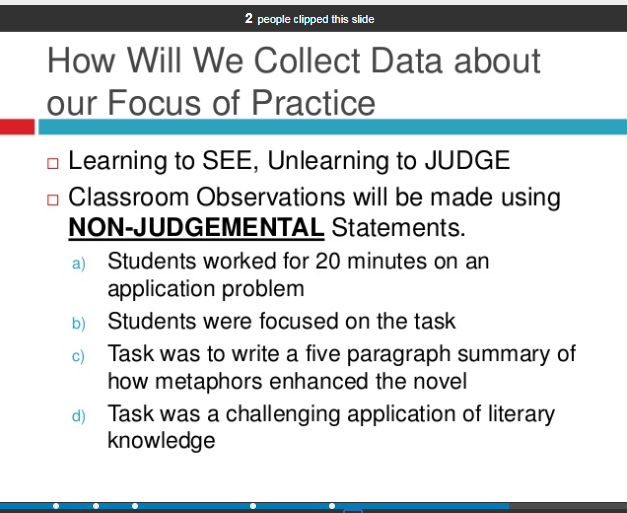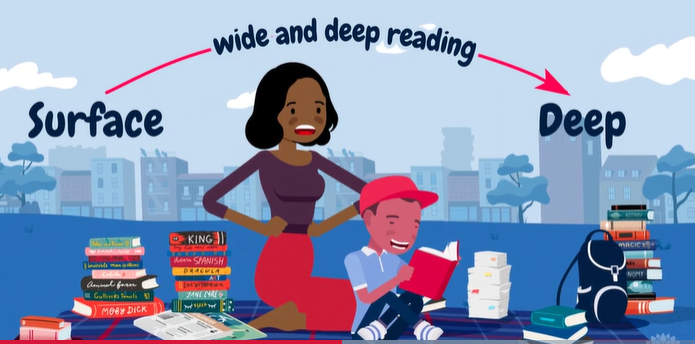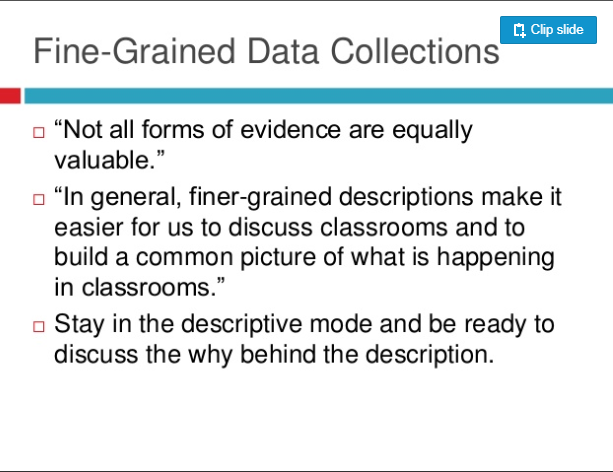What are instructional rounds?
Today we will refresh our understandings of the elements of an Instructional Round to prepare for week 7 when we will be running one across the school. Take either of the two readings and read with the idea of creating together a summary text for the 2019 weebly page.
To begin with lets look at the 'Instructional Core'.
To begin with lets look at the 'Instructional Core'.
7 Principles of the instructional core- elmore
Principle One: Defining the Instructional Core
There are only three ways to improve student learning at scale:
1) Raise the level of content that students are taught.
2) Increase the teachers’ skill & knowledge that they bring to teaching of that content
3) Increase the level of students’ active learning (engagement) of the content The level of content, skill and knowle
There are only three ways to improve student learning at scale:
1) Raise the level of content that students are taught.
2) Increase the teachers’ skill & knowledge that they bring to teaching of that content
3) Increase the level of students’ active learning (engagement) of the content The level of content, skill and knowle
What do we know now about Instructional rounds?
Key ideas:
- there is a whole school problem that we are trying to solve - investigate - analysis
- observers are detectives not inspectors
- inquiry process
-not looking through a window rather more like holding up a mirror
-not focused on one teacher - gather an understanding of what is happening across the school - not personal - collective responsibility
-connected to ongoing improvement
- problem of practice is derived from data
-descriptive and analytic not evaluative
-stops you being judgemental - protocols
-gives you where to go to next - plan the next level of work
- links to the whole school planning process -helps you identify
-observers are there to learn
- predicting phase of the debrief helps you analyse the impact on the students (based on evidence)
- reflecting as a team - what are the next steps? what's working and what's not? Essential! - Shared ownership
- lateral - peer to peer instead of positional
- teachers are usually the most enthusiastic rounds participants - lead the change
- whole school approach
- there is a whole school problem that we are trying to solve - investigate - analysis
- observers are detectives not inspectors
- inquiry process
-not looking through a window rather more like holding up a mirror
-not focused on one teacher - gather an understanding of what is happening across the school - not personal - collective responsibility
-connected to ongoing improvement
- problem of practice is derived from data
-descriptive and analytic not evaluative
-stops you being judgemental - protocols
-gives you where to go to next - plan the next level of work
- links to the whole school planning process -helps you identify
-observers are there to learn
- predicting phase of the debrief helps you analyse the impact on the students (based on evidence)
- reflecting as a team - what are the next steps? what's working and what's not? Essential! - Shared ownership
- lateral - peer to peer instead of positional
- teachers are usually the most enthusiastic rounds participants - lead the change
- whole school approach
Doing the rounds
Step 1: Take on roles
There are six roles:
1. Team leader/ time keeper.
2. Monitoring what students say and do.
3. Looking at student work/ the task.
4. Questioning students.
5. Recording classroom structures.
6. Monitoring what the teacher says and does.
There are six roles:
1. Team leader/ time keeper.
2. Monitoring what students say and do.
3. Looking at student work/ the task.
4. Questioning students.
5. Recording classroom structures.
6. Monitoring what the teacher says and does.
Step 2: Observe classrooms
Step 3: Describe what was observed (expand the vision of what is normally seen)
Step 4: Analyse the descriptions
Step 5: Predict what learning was taking place
Step 6: Evaluate and identify the next level of work
- Take notes about what you see or hear
- Take photos if appropriate
Step 3: Describe what was observed (expand the vision of what is normally seen)
- Reflect on what was observed
- Select pieces of data (pieces of evidence)
relevant to the problem of practice - Share what has been selected
Step 4: Analyse the descriptions
- Group the data (evidence) in ways that is meaningful
- Look for patterns in the data and develop statements to describe these (eg 'questions with single word answers) and place examples under these
headings - May use an external framework such as Bloom's or content area goals to identify patterns
Step 5: Predict what learning was taking place
- Ask - 'If you were a student at this school and you did everything you were
expected to do, what would you know and be able to do?' - ie what causes the
learning we want to see?
Step 6: Evaluate and identify the next level of work
- Determine what resources and support will best meet the needs of teachers and
leaders to move instruction to the next level - Make suggestions about what the group should do 'next week', 'next month', by the end of the year - short and long term actions

- Lets Have a Go- watch the video
https://youtu.be/jzq-kuyhiqs
developing a problem of practice
How are we supporting students to solve maths problems?
Our problem pf practice for IR 1 2019 will be around numeracy and a chance to reflect on the past professional learning experiences we engaged in in 2018. We have used our school data analysis to hypothesise that our approach to teaching students how to solve higher order, more complex maths problems may need some improvements. We have been looking at our classroom dialogue during lessons and working on how we push, stretch and support student thinking.
Our problem pf practice for IR 1 2019 will be around numeracy and a chance to reflect on the past professional learning experiences we engaged in in 2018. We have used our school data analysis to hypothesise that our approach to teaching students how to solve higher order, more complex maths problems may need some improvements. We have been looking at our classroom dialogue during lessons and working on how we push, stretch and support student thinking.



